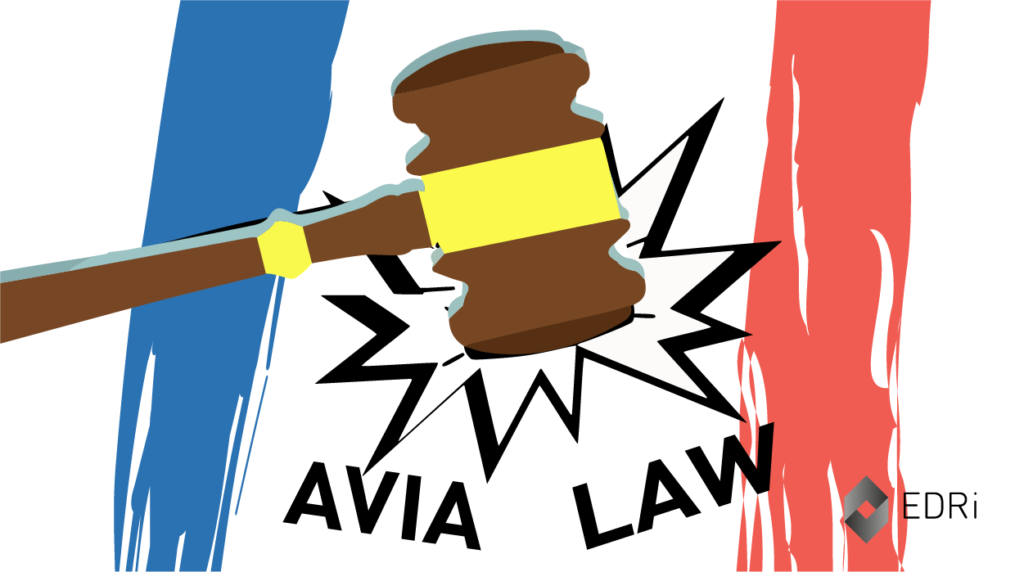French Avia law declared unconstitutional: what does this teach us at EU level?
On 18 June, the French Constitutional Council, the constitutional authority in France, declared the main provisions of the “Avia law” unconstitutional. France’s legislation on hate speech was adopted in May despite being severely criticised from nearly all sides: the European Commission, the Czech Republic, digital rights organisations and LBGTQI+, feminist and antiracist organisations.
On 18 June, the French Constitutional Council, the constitutional authority in France, declared the main provisions of the “Avia law” unconstitutional. France’s legislation on hate speech was adopted in May despite being severely criticised from nearly all sides: the European Commission, the Czech Republic, digital rights organisations and LBGTQI+, feminist and antiracist organisations. Opposed to the main measures throughout the legislative process, the French Senate brought the law before the Constitutional Council as soon as it was adopted.

The Court’s ruling represents a major victory for digital freedoms, not only for French people, but potentially for all Europeans. In past years, France has been championing its law enforcement model for the fight against (potentially) illegal online content at the European Union (EU) level, especially in the framework of the Terrorist Content Regulation, currently in hard-nosed negotiations. The setback received after the Constitutional Court’s decision will likely re-shuffle the cards in the current and future European content
regulation-related files.
The Avia law is “not necessary, appropriate and proportionate”
In its decision, the Constitutional Council held that certain provisions infringe “on freedom of speech and communication, and are not necessary, appropriate and proportionate to the aim pursued”.
Looking at the details of the ruling, the following legal measures in the law that were used to strike down seemingly illegal content were quashed by the Court:
- The sort of “notice-and-action” system by which any user can flag “manifestly illegal” content (among a long pre-set list of offenses) and the notified online service provider is required to remove it within 24 hours,
- The reduction of the intermediary’s deadline to remove illegal terrorist content and child sexual abuse material to one hour after the receipt of a notification by an administrative authority.
- All the best-efforts obligations linked to the unconstitutional removal measures above such as transparency obligations (in terms of access to redress mechanisms and content moderation practices, including the number of removed content, the rate of wrong takedowns,…)
- The power given to the Conseil supérieur de l’audiovisuel (ie. French High Audiovisual Council) with an oversight mandate to monitor the implementation of those best-efforts obligations.
Plot twist!
The Court’s decision will have a decisive impact on the European negotiations on the draft Regulation against the dissemination of terrorist content online. The European Commission hastily published the draft legislation under pressure from France and Germany in 2018 looking towards a quick adoption to serve the Commission’s electoral communication strategy. However, since the trilogues started, the European Parliament and the Council of Member States have been facing a persistent deadlock regarding the proposal’s main measures.
In this context, the Constitutional Council’s ruling comes as a massive blow in the Commission’s and France’s
well-rounded advocacy. In particular, France has been pushing to expand the definition of what constitutes a “competent authority” (institutions with legal authority to make content determinations) under the Regulation to include administrative (aka law enforcement) authorities. Consequently, law enforcement agents would be allowed to issue orders to remove or disable access to illegal terrorist content within an hour.
The Council declared this type of measure as a clear breach of the French Constitution, pointing out the lack of judiciary involvement in the decision to determine whether a specific content published is illegal or not,
and the incentives (in the form of strict deadlines and heavy sanctions) to over zealously block perfectly
legal speech. It draws similar conclusions for the legal arrangements that address potential hate speech.
In general, the Council underlines that only the removal of manifestly illegal content can be ordered without a judge’s prior authorization. However, assessing that a certain piece of content is manifestly illegal requires a minimum of analysis, which is impossible in such a short time frame.
Inevitably, this decision weakens the pro-censorship hardliners’ position in European debates.
Ahead of the Digital Services Act, a legislative package which will update the EU rules governing online service providers’ responsibilities, the European legislators should pay particular attention to this ruling to guarantee the respect of fundamental rights. EDRi and its members will continue to monitor the development of these files and engage with the institutions in the upcoming period.
Read more:
(In French) La Quadrature Du Net, Loi haine: le Conseil constitutionnel refuse la censure sans juge (18.06.2020)
https://www.laquadrature.net/2020/06/18/loi-haine-le-conseil-constitutionnel-refuse-la-censure-sans-juge/
EFF, Victory! French High Court Rules That Most of Hate Speech Bill Would Undermine Free Expression (18.06.2020)
https://www.eff.org/press/releases/victory-french-high-court-rules-most-hate-speech-bill-would-undermine-free-expression
Constitutional Council declares French hate speech ‘Avia’ law unconstitutional (18.06.2020)
https://www.article19.org/resources/france-constitutional-council-declares-french-hate-speech-avialaw-unconstitutional/
France’s law on hate speech gets a thumbs down (04.12.2019)
https://edri.org/frances-law-on-hate-speech-gets-thumbs-down/
(Contribution by Chloé Berthélémy, EDRi Policy Advisor)


